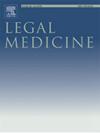Forensic and ecological significance of necrophagous insects: Insights from animal carcasses, human cadavers, and myiasis patients
IF 1.3
4区 医学
Q3 MEDICINE, LEGAL
引用次数: 0
Abstract
Necrophagous insects, including flies and beetles, play pivotal roles in decomposition, ecology, and forensics. Their diversity and activities vary across environments, necessitating comprehensive studies for understanding and management. The aim of the study is to investigate insect infestation on animal carcasses, human cadavers, and myiasis patients to enhance ecological, forensic, and medical entomological understanding, aiding in ecosystem management, forensic investigations, and disease control.
Various species of flies and beetles were found associated with animal carcasses, human cadavers, and myiasis patients, as indicated by the comprehensive study. On animal carcasses, notable fly species included Chrysomya rufifacies (Macquart, 1842), Chrysomya megacephala (Fabricius, 1794), Lucilia cuprina (Wiedemann, 1830), and Sarcophaga sp., while beetles such as Dermestes maculatus (De Geer, 1774), Necrobia rufipes (Fabricius, 1781), Saprinus quadrigatattus (Fabricius, 1798), Saprinus splendens (Paykull, 1811), Saprinus optabilis (Marseul, 1855), Saprinus chalcites (Iliger, 1807), and Omorgus sp. (Erichson, 1847) were also observed. Similarly, human cadavers exhibited a presence of flies like Chrysomya albiceps (Wiedemann, 1819), Chrysomya rufifacies (Macquart, 1842), Chrysomya megacephala (Fabricius, 1794), and Sarcophaga dux (Thomson, 1869). In cases of myiasis patients, flies including Chrysomya megacephala, Cochliomyia hominivorax (Coquerel, 1858), and Chrysomya bezziana (Villeneuve, 1914) were identified.
These findings underscore the diverse range of insect species involved in carcass decomposition, forensic investigations, and medical entomology, illustrating their crucial roles in ecological processes, forensic assessments, and disease management.
食尸昆虫的法医学和生态学意义:从动物尸体、人类尸体和蠅蛆病患者身上获得的启示
包括苍蝇和甲虫在内的食尸昆虫在分解、生态学和法医学中发挥着举足轻重的作用。它们的多样性和活动因环境而异,因此有必要进行全面研究,以便了解和管理。这项研究的目的是调查动物尸体、人类尸体和蠅蛆病患者身上的昆虫侵扰情况,以加深对生态学、法医学和医学昆虫学的了解,从而有助于生态系统管理、法医调查和疾病控制。在动物尸体上,值得注意的苍蝇种类包括 Chrysomya rufifacies(Macquart,1842 年)、Chrysomya megacephala(Fabricius,1794 年)、Lucilia cuprina(Wiedemann,1830 年)和 Sarcophaga sp.、同时还观察到 Dermestes maculatus(De Geer,1774 年)、Necrobia rufipes(Fabricius,1781 年)、Saprinus quadrigatattus(Fabricius,1798 年)、Saprinus splendens(Paykull,1811 年)、Saprinus optabilis(Marseul,1855 年)、Saprinus chalcites(Iliger,1807 年)和 Omorgus sp.(Erichson,1847 年)等甲虫。同样,在人体尸体上也发现了一些苍蝇,如 Chrysomya albiceps(Wiedemann,1819 年)、Chrysomya rufifacies(Macquart,1842 年)、Chrysomya megacephala(Fabricius,1794 年)和 Sarcophaga dux(Thomson,1869 年)。这些发现强调了参与尸体分解、法医调查和医学昆虫学的昆虫种类的多样性,说明了它们在生态过程、法医评估和疾病管理中的重要作用。
本文章由计算机程序翻译,如有差异,请以英文原文为准。
求助全文
约1分钟内获得全文
求助全文
来源期刊

Legal Medicine
Nursing-Issues, Ethics and Legal Aspects
CiteScore
2.80
自引率
6.70%
发文量
119
审稿时长
7.9 weeks
期刊介绍:
Legal Medicine provides an international forum for the publication of original articles, reviews and correspondence on subjects that cover practical and theoretical areas of interest relating to the wide range of legal medicine.
Subjects covered include forensic pathology, toxicology, odontology, anthropology, criminalistics, immunochemistry, hemogenetics and forensic aspects of biological science with emphasis on DNA analysis and molecular biology. Submissions dealing with medicolegal problems such as malpractice, insurance, child abuse or ethics in medical practice are also acceptable.
 求助内容:
求助内容: 应助结果提醒方式:
应助结果提醒方式:


